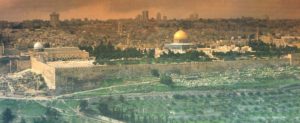 “The Jewish pilgrim Isaac ben Joseph ibn Chelo states that:
“The Jewish pilgrim Isaac ben Joseph ibn Chelo states that:
‘The Jewish community in Jerusalem is quite numerous… Among the different members of the holy congregation at Jerusalem are many who are engaged in handicrafts such as dyers, tailors, shoemakers, etc. Others carry on a rich commerce in all sorts of things, and have fine shops. Some are devoted to science, as medicine, astronomy and mathematics. But the greater number of their learned men are working day and night at the study of the Holy Law [the Torah and Talmud] and of the true wisdom, which is the cabbalah [mystic interpretation of the biblical texts]. They are maintained out of the coffers of the community, because the study of the law is their only calling.’
‘There are also at Jerusalem excellent calligraphist, and the copies are sought for by the strangers, who carry them away to their own countries. I have seen a Pentateuch written with so much art that several persons at once wanted to acquire it, and it was only for excessively high price that the Chief of the Synagogue of Babylon carried it off with him to Baghdad.’
His one doleful experience in Jerusalem is with the Temple Mount, on which he is not allowed to set foot, and when he sees the Dome of the Rock and the Mosque of El-Aksa, he cries:
‘Alas, by reasons of our sins, where the sacred building once stood, its place is taken by a profane temple, built by the King of the Ishmaelites [Muslims] when he conquered Palestine and Jerusalem from the uncircumcised [Gentiles].’ But he calls ‘one of seven wonders of the Holy City the Western Wall which stands before the Temple… The Jews resort thither to say their prayers.’
Hebron is among the other places in Judea visited by ibn Chelo, and he wrote:
‘The Jews, who are very numerous here, do a considerable trade in cotton, which they spin and dye themselves, as well as in all sorts of glass-ware made by them in Hebron.’ ‘They have an ancient synagogue and pray there day and night, for they are very devout.’
Since they were forbidden access to the Cave of the Patriarchs in Hebron
‘During the ten days of penitence [between the Jewish New Year and the Day of Atonement] they visit the tombs of Jesse, father of King David, and of Abner, son of Ner. There, with faces turned toward the Cave of Machpelah they implore that God will have mercy and restore this sacred place where the patriarchs are buried into their hands, as in former days they used to be.”
Source: Kollek, Teddy; Pearlman, Moshe. Pilgrims to the Holy Land: The story of Pilgrimage Through the Ages. p135 and p136.